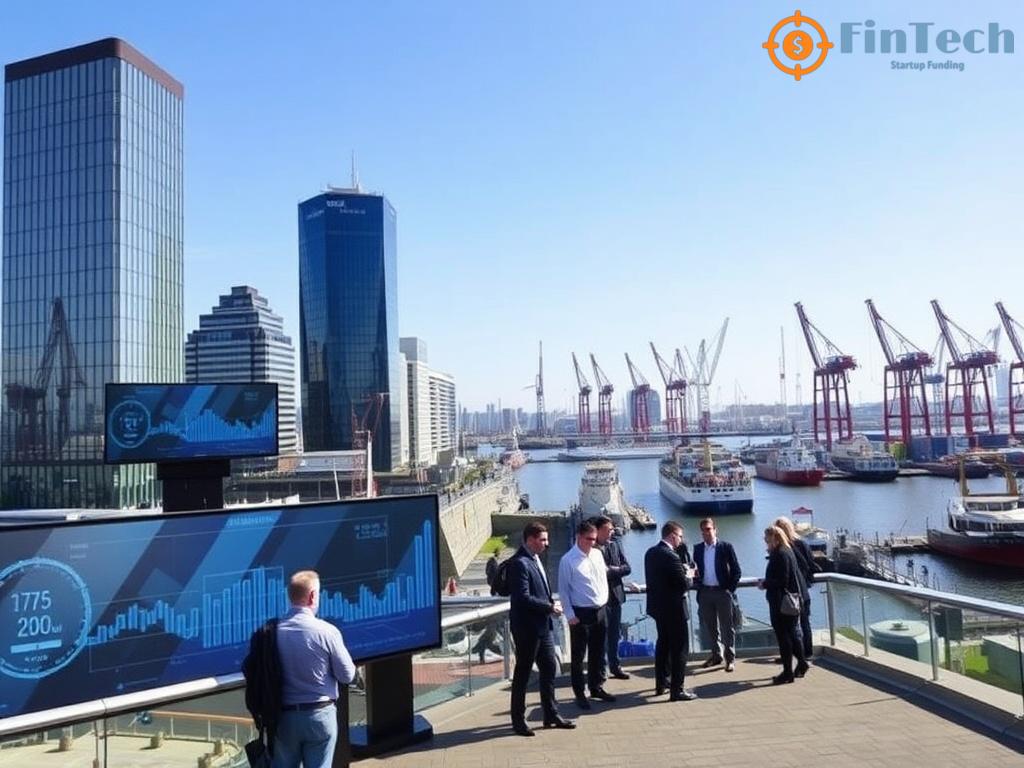Overview of Hamburg’s FinTech Landscape

Hamburg, a city renowned for its rich maritime history, is rapidly emerging as a significant FinTech hub in Germany. The unique intersection of finance and maritime commerce has created an ecosystem ripe for innovation. This article delves into the various facets of Hamburg’s FinTech landscape, highlighting key players, trends, and the factors that contribute to its growth.
The FinTech scene in Hamburg is characterized by a diverse range of startups and established companies that are reshaping the financial services industry. From payment solutions to blockchain technologies, these organizations are leveraging cutting-edge technologies to drive efficiency and enhance customer experiences.
Companies to Watch:
- finleap – A prominent player specializing in building and investing in financial services companies.
- Tomorrow – A sustainable banking solution focused on eco-friendly financial products.
- Plan A – A platform that aids businesses in measuring and reducing their carbon footprint.
What sets Hamburg apart from other FinTech hubs is its strong maritime finance sector. The city’s strategic location as a major port facilitates a unique blend of traditional maritime finance and modern FinTech solutions. This synergy is paving the way for innovative financing models tailored to the needs of shipping and logistics companies.
| FinTech Innovations | Description |
|---|---|
| Blockchain for Shipping | Utilizing blockchain technology to enhance transparency and traceability in shipping logistics. |
| Smart Contracts | Implementing smart contracts to automate transactions and reduce operational costs. |
| Digital Insurance Platforms | Creating digital solutions for marine insurance to streamline claims and underwriting processes. |
Innovative Financing Models in Maritime Sector
The maritime sector, integral to global trade, is witnessing a transformative shift in financing models, largely influenced by Hamburg’s thriving FinTech ecosystem. As the industry grapples with traditional financial constraints, innovative financing solutions are emerging, enabling shipping and logistics companies to optimize their capital structures and operational efficiencies. This shift is not only enhancing liquidity but also equipping businesses to navigate the complexities of modern maritime commerce.
As traditional financing avenues become less viable, the maritime sector is embracing several innovative approaches that cater specifically to its unique challenges. These solutions leverage technology to create more flexible, transparent, and efficient financial processes. Below are some of the noteworthy models that are shaping the future of maritime financing:
- Asset-Based Financing: This model allows companies to secure loans against their vessels and other assets, providing immediate liquidity while minimizing risk.
- Crowdfunding Platforms: Digital platforms enable shipowners to raise capital directly from investors, democratizing access to maritime investments.
- Blockchain-Enabled Financing: By utilizing blockchain technology, transactions in maritime financing can be made more secure and efficient, reducing fraud and enhancing trust among stakeholders.
To better understand the advantages and limitations of these financing models, we can compare their key features in the following table:
| Financing Model | Advantages | Limitations |
|---|---|---|
| Asset-Based Financing | Quick access to funds; Lower interest rates | Requires collateral; Asset depreciation risk |
| Crowdfunding Platforms | Diverse funding sources; Community engagement | Potential for regulatory challenges; Uncertain investor returns |
| Blockchain-Enabled Financing | Increased transparency; Reduced transaction costs | Technology adoption barriers; Need for regulatory clarity |
As we explore these innovative financing models, it becomes evident that Hamburg’s FinTech scene is not merely a bystander but a catalyst for change in the maritime sector. The convergence of technology and finance is paving the way for a more resilient and dynamic maritime economy, setting a precedent for other global hubs to follow.
Regulatory Framework Impacting Maritime Finance
The maritime finance sector is undergoing a significant transformation, influenced not only by technological advancements but also by the regulatory framework that governs it. Hamburg, as a burgeoning FinTech hub, is at the forefront of this evolution, where regulatory considerations are crucial in shaping the future of maritime finance. Understanding how these regulations interact with innovation is essential for stakeholders seeking to leverage the opportunities presented by this dynamic landscape.
Regulatory bodies play an integral role in ensuring stability and transparency within the maritime finance ecosystem. As companies in Hamburg adopt innovative financing models, they must navigate a complex web of local, national, and international regulations. This regulatory environment provides a foundation for fostering trust among investors and consumers, which is critical when dealing with high-value transactions that characterize maritime commerce.
As the maritime finance industry embraces disruptive technologies, compliance with evolving regulations becomes paramount. Companies operating in this sector must balance their innovative pursuits with adherence to regulatory standards to avoid potential pitfalls. The integration of technology, such as blockchain and digital platforms, introduces new compliance challenges that require a proactive approach from stakeholders.
Moreover, the need for regulatory clarity is pressing. The maritime sector thrives on global trade, and as such, regulations must be harmonized across jurisdictions to facilitate smoother transactions. Collaboration between regulators and industry players is essential for creating a conducive environment where innovation and compliance can coexist. This dialogue can lead to the development of frameworks that not only protect stakeholders but also encourage the adoption of cutting-edge financial solutions.
Key Players and Startups in Hamburg’s FinTech Scene
The vibrant FinTech ecosystem in Hamburg is not only a testament to the city’s maritime heritage but also a fertile ground for innovation driven by a diverse array of key players and startups. These organizations are at the forefront of redefining the financial services landscape, providing cutting-edge solutions tailored to the unique challenges faced by the maritime sector. As we delve deeper, we find that their contributions are pivotal in shaping the future of maritime finance.
Among the notable startups, MaritimeTech stands out as a game-changer, harnessing the power of data analytics and artificial intelligence to optimize shipping routes and reduce operational costs. This startup is transforming how shipping companies manage their logistics, ensuring not only efficiency but also environmental sustainability. Another noteworthy player is ShipChain Solutions, which is pioneering the use of blockchain technology to enhance traceability in maritime supply chains. Their innovative approach ensures that every transaction is transparent and secure, fostering trust among stakeholders.
Furthermore, the rise of FinMar, a digital finance platform, cannot be overlooked. This startup specializes in providing tailored financing options for shipping firms, allowing them to access capital quickly and efficiently, which is crucial in today’s fast-paced market. With these startups leading the charge, it is evident that Hamburg’s FinTech scene is not just about traditional banking; it’s about leveraging technology to create solutions that resonate with the maritime industry.
In addition to the dynamic startups, established players such as HSH Nordbank are playing a crucial role in Hamburg’s FinTech evolution. As a leading maritime bank in Germany, they are actively investing in innovative technological solutions to enhance their service offerings. Their commitment to integrating FinTech into their operations exemplifies how traditional financial institutions can adapt to the changing landscape while maintaining stability and compliance.
Moreover, Norddeutsche Landesbank is also making significant strides by collaborating with startups to co-develop financial products tailored to the maritime sector. This collaboration not only fuels innovation but also bridges the gap between established financial practices and emerging technologies, ensuring that Hamburg remains at the forefront of maritime finance innovation.
As the landscape continues to evolve, the collaboration between startups and established institutions will be instrumental in driving further innovation. The table below illustrates how these key players complement each other in the ecosystem, showcasing their distinct roles in advancing Hamburg’s FinTech landscape.
| Player Type | Key Player | Focus Area | Innovation Aspect |
|---|---|---|---|
| Startup | MaritimeTech | Data Analytics | Optimizing Shipping Routes |
| Startup | ShipChain Solutions | Blockchain | Supply Chain Traceability |
| Startup | FinMar | Digital Financing | Tailored Capital Access |
| Established | HSH Nordbank | Maritime Banking | Technological Integration |
| Established | Norddeutsche Landesbank | Collaborative Innovation | Co-developing Financial Products |
Future Trends in German Maritime Finance
As the maritime finance landscape continues to evolve, the future promises to be marked by transformative trends that leverage technology and innovation. Hamburg, positioned at the heart of this evolution, is set to witness a paradigm shift in how financial services cater to the maritime industry. The intersection of digitalization, sustainability, and regulatory advancements will redefine operational efficiencies and foster new opportunities.
Digital Transformation will play a pivotal role in shaping the future of maritime finance. The adoption of advanced technologies such as artificial intelligence, machine learning, and big data analytics will empower stakeholders to make informed decisions based on real-time insights. Shipping companies will increasingly rely on predictive analytics to optimize routes, manage risks, and enhance supply chain transparency. This shift towards data-driven decision-making is expected to streamline operations and reduce costs significantly.
Moreover, the emergence of green financing will further influence maritime finance trends. With a growing emphasis on sustainability, financial institutions in Hamburg are likely to prioritize eco-friendly investments and financing options that support green initiatives within the maritime sector. This trend will not only align with global sustainability goals but also attract investors who are keen to support environmentally conscious projects, thereby enhancing the reputation of Hamburg as a leader in sustainable finance.
As the maritime finance sector adapts to innovative practices, the role of regulatory frameworks will become increasingly significant. Regulatory bodies must evolve alongside technological advancements to ensure that compliance does not stifle innovation. In Hamburg, ongoing dialogue between regulators and industry leaders will be crucial in establishing guidelines that promote growth while safeguarding stakeholders’ interests.
Furthermore, the integration of blockchain technology into maritime finance is expected to gain momentum. This technology can enhance transaction security and transparency, making it easier for stakeholders to verify information related to shipping contracts and financial agreements. As regulations around blockchain continue to develop, we can anticipate more widespread adoption within the maritime finance ecosystem, encouraging trust and collaboration among participants.
In conclusion, the future of German maritime finance is poised for significant advancements driven by digital transformation, sustainability, and regulatory evolution. Hamburg’s position as a FinTech hub will play a crucial role in harnessing these trends, fostering an environment where innovation can thrive, and enabling stakeholders to navigate the complexities of the maritime finance landscape with confidence.



